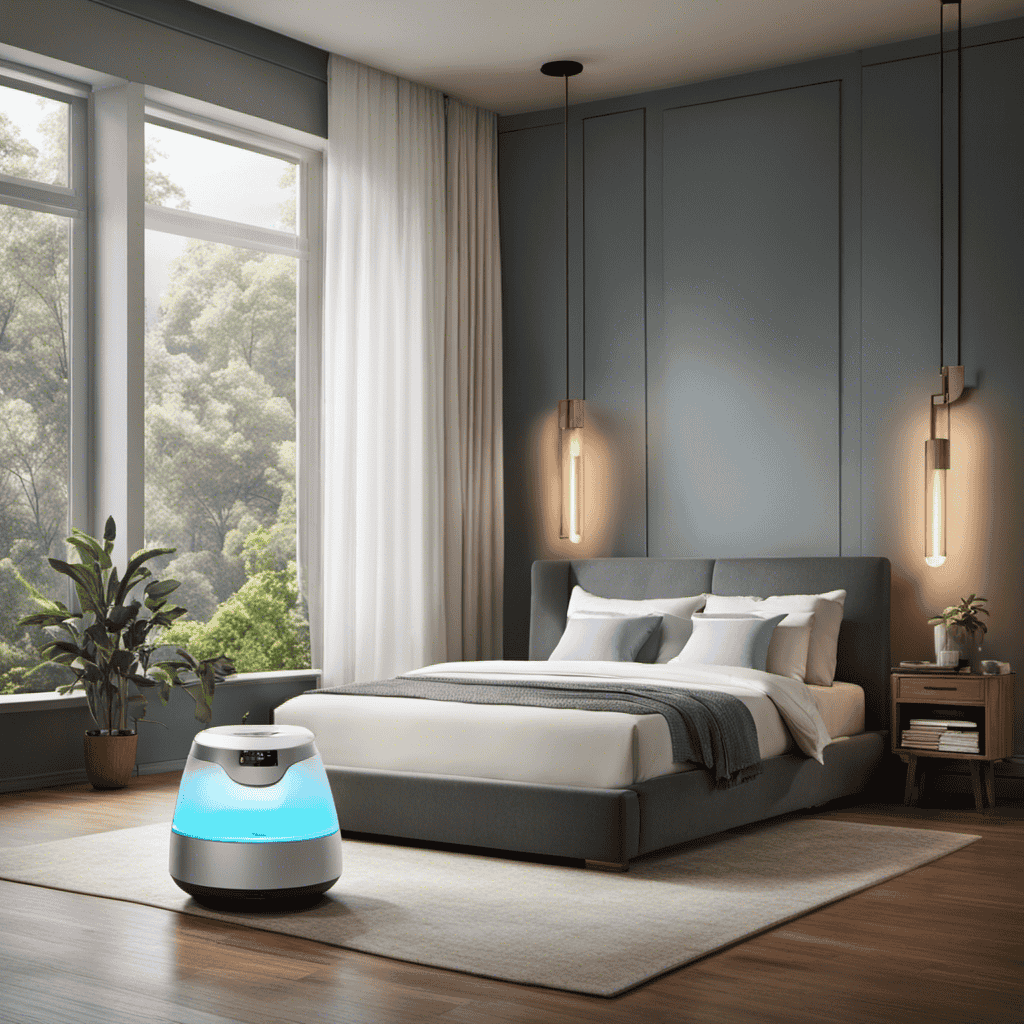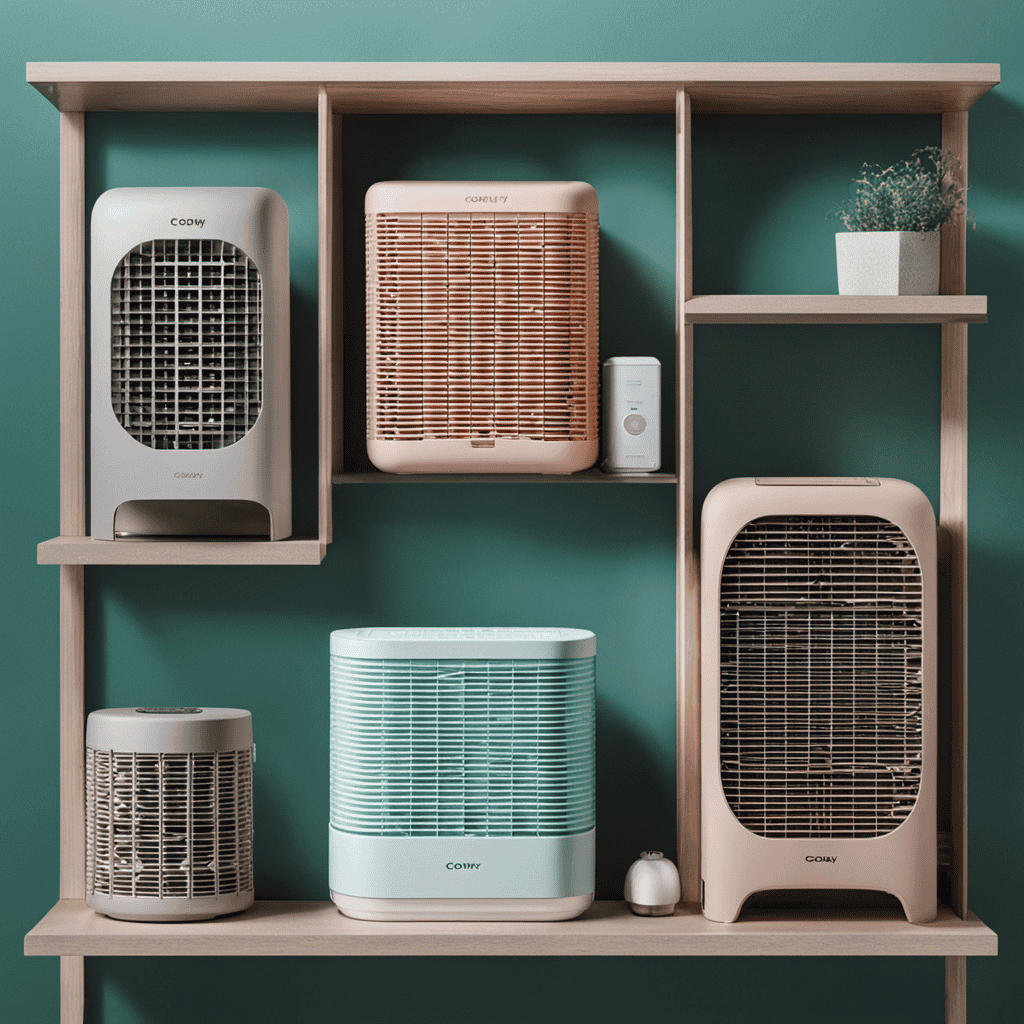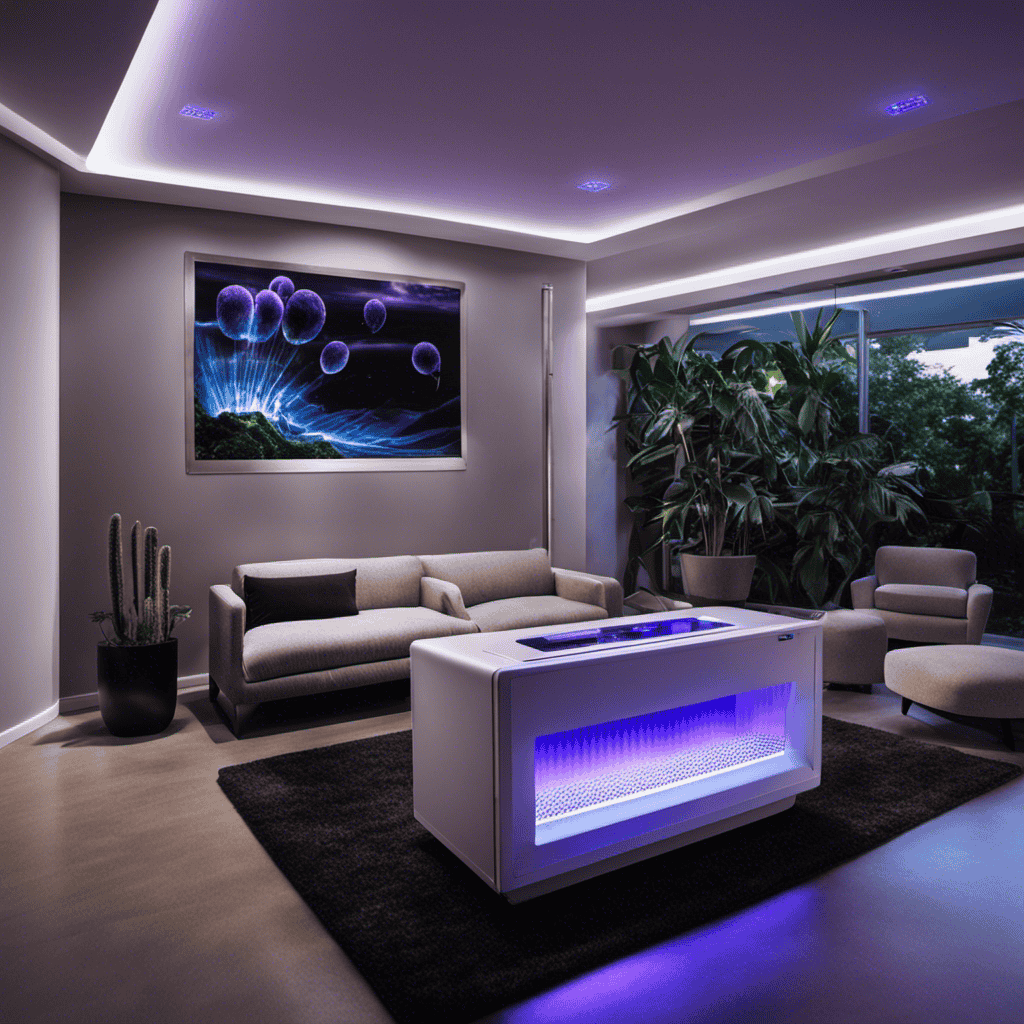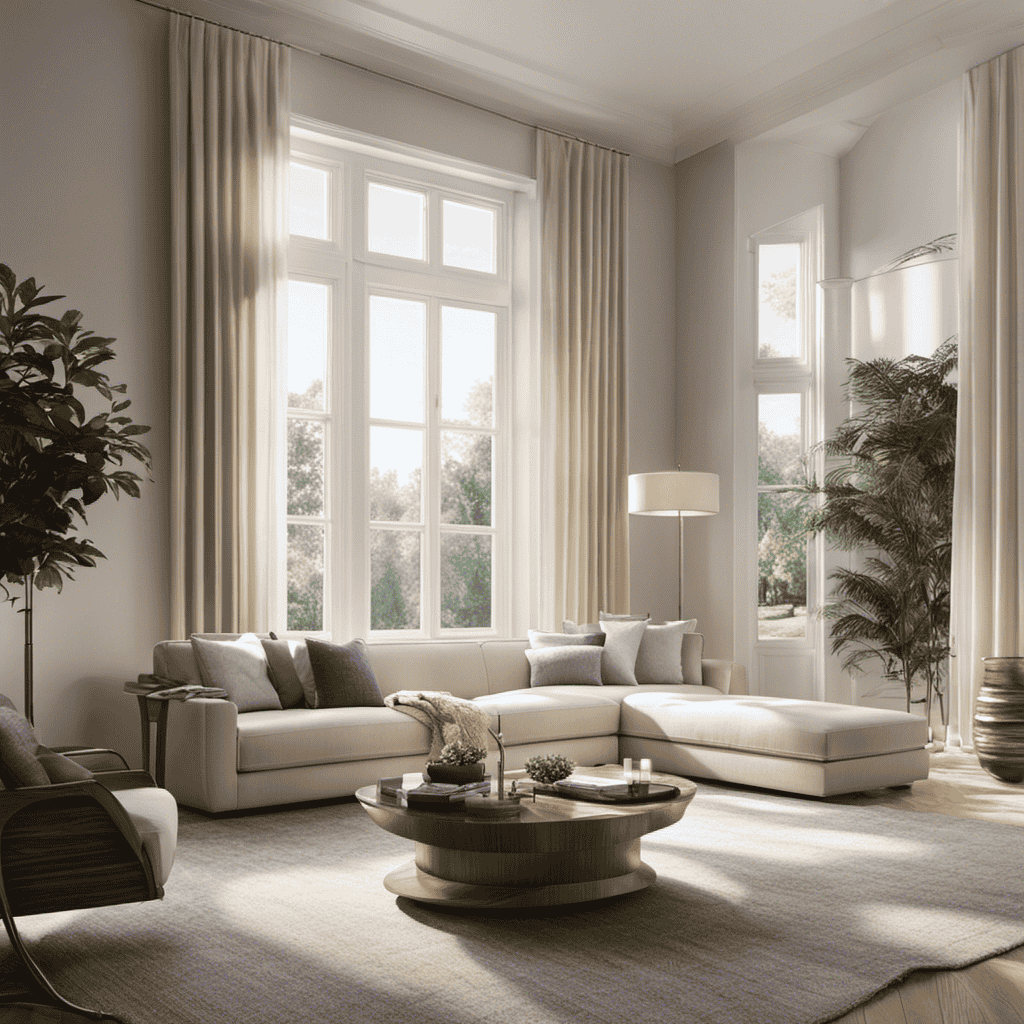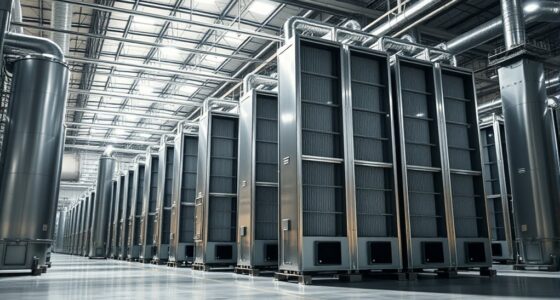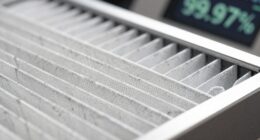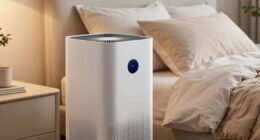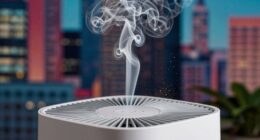As a long-time allergy sufferer, I empathize with the ongoing quest for relief. This led me to explore the perennial question: humidifier vs air purifier?
In this article, we’ll explore the pros and cons of both options and uncover the key differences between them. Whether you’re looking to ease nasal congestion or reduce allergens in your home, I’ll provide evidence-based insights to help you make an informed decision.
So, let’s get started on finding the best solution for your allergy woes.
Key Takeaways
- Humidifiers alleviate dryness, congestion, and irritation in nasal passages and throat.
- Air purifiers reduce allergens like dust mites, pollen, pet dander, and mold spores.
- The choice between a humidifier and an air purifier depends on specific allergy symptoms, indoor environment, and personal preferences.
- Both options have their advantages and should be considered based on individual needs.
Pros and Cons of Using a Humidifier for Allergies
If you’re considering using a humidifier for allergies, it’s important to know the pros and cons.
One of the advantages of using a humidifier is that it can help alleviate dryness and irritation in the nasal passages, throat, and skin. This can be especially beneficial for individuals who experience symptoms such as congestion, coughing, and dry, itchy skin due to allergies. Additionally, a humidifier can help create a more comfortable living environment by adding moisture to the air, which can also help reduce snoring and improve sleep quality.
However, there are also some disadvantages to using a humidifier for allergies. If not properly maintained, a humidifier can become a breeding ground for mold, bacteria, and other allergens, which can worsen allergy symptoms. It’s important to regularly clean and disinfect your humidifier to prevent this from happening. Additionally, using a humidifier in excess can lead to too much moisture in the air, which can promote the growth of dust mites and mold, both of which can trigger allergies. It’s important to find the right balance and monitor humidity levels in your home when using a humidifier for allergies.
Pros and Cons of Using an Air Purifier for Allergies
To decide whether or not to use an air purifier for your allergies, you should consider the pros and cons. Here are four things to think about:
-
Advantages: Air purifiers can help remove allergens from the air, such as pollen, dust mites, and pet dander. They can also filter out other pollutants like smoke and mold spores. This can lead to improved indoor air quality and potentially reduce allergy symptoms.
-
Disadvantages: Air purifiers can be expensive to purchase and maintain. Some models may produce ozone, which can irritate the lungs and worsen allergies. Additionally, air purifiers may not be as effective in eliminating larger particles like pet hair or certain chemicals.
-
Effectiveness: The effectiveness of an air purifier depends on factors such as the size of the room, the type of filter used, and the air exchange rate. It’s important to choose the right size and type of purifier for your specific needs.
-
Complementary measures: While air purifiers can be helpful, they should not be the sole solution for allergies. It’s important to also take other measures like keeping your home clean, using hypoallergenic bedding, and managing humidity levels.
Key Differences Between Humidifiers and Air Purifiers for Allergies
One of the key differences between humidifiers and air purifiers is that humidifiers add moisture to the air, while purifiers remove pollutants.
Humidifiers are beneficial for allergies because they help to alleviate symptoms such as dryness, congestion, and irritation in the nasal passages and throat. By increasing the humidity level in the air, humidifiers can provide relief from allergy symptoms and promote better breathing.
On the other hand, air purifiers are effective in reducing allergens in the air, such as dust mites, pollen, pet dander, and mold spores. They work by filtering the air and trapping these particles, thus improving indoor air quality and reducing allergy triggers.
When deciding between a humidifier and an air purifier for allergies, it is important to consider factors such as the specific allergy symptoms, the indoor environment, and personal preferences.
Factors to Consider When Choosing Between a Humidifier and an Air Purifier for Allergies
When choosing between a humidifier and an air purifier for allergies, consider factors such as your specific allergy symptoms, the indoor environment, and your personal preferences.
Here are four important factors to consider in the effectiveness comparison:
-
Allergy Symptoms: Identify your specific allergy symptoms, whether they are related to dryness or airborne particles. A humidifier is effective for dryness-related symptoms, such as dry skin and nasal passages. On the other hand, an air purifier is more suitable for allergies caused by airborne particles like dust, pet dander, or pollen.
-
Indoor Environment: Assess the size of the room you want to improve. A humidifier is beneficial for smaller spaces, while an air purifier is more effective in larger rooms. Additionally, consider factors like humidity levels and air quality in your home.
-
Personal Preferences: Think about your lifestyle and personal preferences. Some individuals prefer the soothing mist of a humidifier, while others prefer the quiet operation of an air purifier.
-
Budget and Maintenance: Consider the cost and maintenance requirements of both options. Humidifiers require regular cleaning and refilling, while air purifiers often require filter replacements.
Considering these factors will help you make an informed decision on whether a humidifier or an air purifier is the best choice for your allergies.
Now let’s explore some tips for maximizing the effectiveness of these devices for allergy relief.
Tips for Maximizing the Effectiveness of a Humidifier or Air Purifier for Allergy Relief
If you want to maximize the effectiveness of your device for allergy relief, consider implementing these helpful tips.
First, regular maintenance is key to keeping your humidifier or air purifier clean and efficient. Make sure to clean and change the filters as recommended by the manufacturer. This will ensure that your device is removing allergens and pollutants effectively.
Additionally, it is important to choose the right size and capacity for your humidifier or air purifier. A device that is too small may not effectively cover the area you need, while a device that is too large may be wasteful and inefficient. Consider the square footage of the room and the recommended coverage area of the device when making your choice.
Frequently Asked Questions
Can a Humidifier or Air Purifier Completely Eliminate Allergies?
A humidifier or air purifier alone cannot completely eliminate allergies. While a humidifier can help with dryness, an air purifier can remove allergens from the air. However, a comprehensive approach is needed for complete allergy relief.
Can a Humidifier or Air Purifier Worsen Allergy Symptoms?
Using a humidifier or air purifier can worsen allergy symptoms. They can exacerbate allergies by circulating allergens or creating an environment favorable for dust mites and mold growth.
Can a Humidifier or Air Purifier Be Used in Conjunction With Allergy Medication?
Using a humidifier and air purifier in conjunction with allergy medication can provide relief from allergy symptoms. The humidifier benefits by adding moisture to the air, while the air purifier effectively removes allergens.
Can a Humidifier or Air Purifier Help With Specific Allergies, Such as Pet Dander or Pollen?
A humidifier can help alleviate symptoms of dryness and congestion caused by allergies. An air purifier, on the other hand, can effectively remove airborne allergens like pet dander and pollen, providing relief for allergy sufferers.
Can a Humidifier or Air Purifier Prevent Allergies From Occurring in the First Place?
A humidifier can help prevent allergies by adding moisture to the air, which can reduce irritation in the nasal passages and respiratory system. On the other hand, an air purifier can effectively remove allergens from the air, reducing the risk of allergic reactions.
Would a Honeywell True HEPA Air Purifier Be Better for Allergies Than a Humidifier?
If you suffer from allergies, a Honeywell True HEPA Air Purifier may be more beneficial than a humidifier. The Honeywell True HEPA Air Purifier can effectively remove allergens such as pollen, pet dander, and dust mites from the air, providing relief for allergy sufferers.
Conclusion
After considering the pros and cons of using a humidifier and an air purifier for allergies, it is clear that both options have their advantages and limitations.
While a humidifier can help alleviate dryness and soothe irritated sinuses, an air purifier is more effective in removing allergens and pollutants from the air.
The decision ultimately depends on individual needs and preferences. However, it is important to note that neither option is a cure-all solution for allergies.
Consulting with a healthcare professional and implementing a comprehensive allergy management plan is still recommended.
